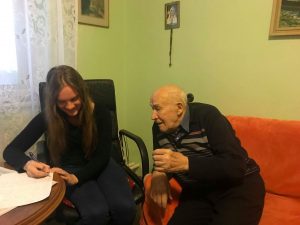Ask Your Grannies
The main idea behind the GACY’68 project, and thus behind the Ask Your Grannies contest, is to unveil 1968 stories that you won’t find in textbooks. We wanted to discover the stories of ordinary people who found themselves in a difficult, if not dangerous, situation at that time. They all have something in common, but each of them is a little bit different. Only a few of them have entered history books, but the reality of 1968 is created of many other stories brought together. If we do not record them, they will be forgotten along with the people who
have experienced them.

Together with some secondary school teachers, we organized an essay competition Ask Your Grannies. While reading the works we were sometimes overwhelmed by emotions, and sometimes there were even tears or a good laugh while reading a funny story. We were especially pleased to find parts of the essays that told us the pupils learned something completely new for them. Thirteen secondary schools attended the competition submitting 195 essays. In each school that fulfilled the conditions set by statute of the competition, there was first a school round in which three winners were announced. Among them, the jury selected ten winning essays. The jury also awarded three Grand Jury Prizes – essays that really grabbed the jurymen’s hearts. Works that were good not only from the literary point of view, but also they were telling a powerful story.
Winners of the school round:
•Alexandra Foltínska – Poprad
•Katarína Bojkovská – Bratislava
•Alexander Oláh – Michalovce
•Martin Boor – Trnava
•Simona Máchová – Žilina
•Tadeáš Vríčan – Skalica
•Terézia Pasminková – OA Trenčín
•Lenka Mečochová – Sereď
•Adela Timková – Poprad
•Sofia Pračková – Banská Štiavnica
Winners of the Grand Jury Prize:
•Oskar Bíreš – Trenčín
•Nikoletta Zeleňanská – Banská Štiavnica
•Sofia Štubňová – Trnava
Thanks to this competition, we collected a large number of stories coming from various parts of Slovakia. However, we are most pleased that we have triggered an intergenerational dialogue and thus attracted the attention of secondary school pupils to a topic they are not normally interested in – the year of 1968. In their essays, the pupils also wrote about how new and shocking the information was, they find it difficult to imagine that something like this should happen now and affect their own lives. We believe that we have contributed to increasing students‘
interest in our history, its legacy and, ultimately, its impact on the present times.
